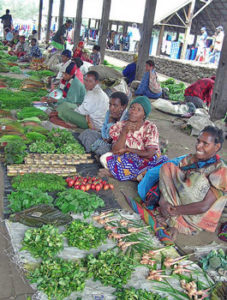

Conference Topic Overview
WASTE NOT, WANT NOT:
The Circular Economy to Food Security
29-30 August 2016, Canberra

| Conference Home Topic Overview Conference Program Speakers’ Bios & Abstracts Sir John Crawford Address Conference Scholars Conference Sponsors Conference Media |
Topic OverviewTitled ‘Waste Not Want Not: the Circular Economy to Food Security’ the conference was structured around the field to fork value chain: production, post production procedures, processing, distribution and consumption. We also, distinctively, added presentations on the roles of supermarkets, the private sector and on the management and reuse of waste.
From the perspective of sustainability and the environmental systems that support agriculture, reduction in food waste and loss clearly help to reduce the 60-70 per cent additional food production that the FAO estimates we need to feed nearly 10 billion people by 2050. Saving on waste translates into less water and fertiliser inputs, reduced energy costs and less pressure on ecosystem services. Thus the environmental dimension of FLW cannot be ignored. In fact, the earth’s natural resources, including an unpolluted atmosphere, soils and water are the common foundation upon which global food security rests and which is threatened by unproductive use: food lost or wasted in one country draws on or pollutes this common base thereby inextricably linking all countries in a shared responsibility or circular economy.
Finally, we recognise that reducing FLW is a complex problem in which knowledge, behaviours and economics are intertwined along the entire chain. Accordingly, we included this year a group of innovative case studies of work that are underway and having real impact in developing countries and in Australia. We asked speakers to consider not only the innovations needed, but if possible, the costs of such interventions and the policy, regulatory and behavioural changes needed to move our food system towards a more sustainable future. You can download a PDF version of our conference flyer here. For details on the presentations, visit our Program page. |

 To reduce losses in the food supply chain will require innovation, improved transport infrastructure, improved storage and packaging, all of which will need substantial investment. In terms of the estimated more than 250kg/person/year estimates of waste at the point of consumption in Western countries, these will only be combated by behavioural and potential regulatory changes across societies.
To reduce losses in the food supply chain will require innovation, improved transport infrastructure, improved storage and packaging, all of which will need substantial investment. In terms of the estimated more than 250kg/person/year estimates of waste at the point of consumption in Western countries, these will only be combated by behavioural and potential regulatory changes across societies.